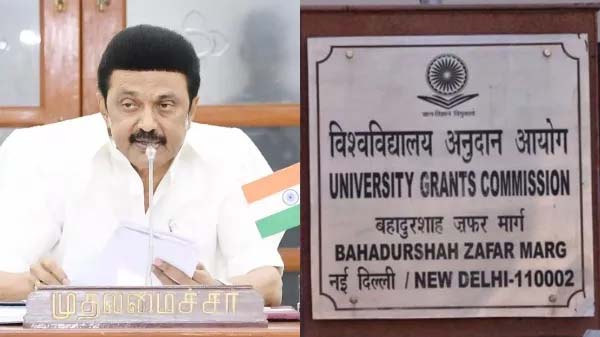Tamil Nadu: Chief Minister M.K. Stalin has written a letter to Union Education Minister Dharmendra Pradhan urging him to withdraw the draft norms issued by UGC regarding the appointment of Vice Chancellors in universities. Tamil Nadu Chief Minister M.K.Stalin today (20-1-2025) wrote a letter to Union Education Minister Dharmendra Pradhan, enclosing a copy of the resolution unanimously passed in the Tamil Nadu Legislative Assembly on 9.1.2025, urging him to withdraw the recently issued draft norms issued by the University Finance Committee (UGC) regarding the appointment of Vice Chancellors in universities, in that letter the University Grants Commission (UGC) has published The Chief Minister of Tamil Nadu has written this letter to express his deep concern about the draft norms and he would like to mention that many provisions in the draft norms are contrary to the educational system and educational policies of the states.
Also, some of the major provisions of concern related to the draft of UGC (Minimum Standards for Award of Undergraduate Degrees and Postgraduate Degrees) – Regulations 2024 are mentioned as follows.
Advertisement1. Conducting entrance exams for undergraduate and postgraduate admissions:
The Chief Minister said the proposal for common entrance exams has raised various concerns among students and parents, stating that the academic potential of students has already been adequately assessed through robust final exams by the state and national education boards and hence introducing an entrance exam for admissions would be unnecessary and cumbersome.
Noting that entrance exams create anxiety among students and create a financial burden on socio-economically backward students, the Chief Minister said if entrance exams are made compulsory, schools may focus on coaching for entrance exams, which will hamper the functioning of school education. Tamil Nadu’s higher education enrolment rate (GER 47%) is already the highest in the country, so entrance exams will definitely reduce enrolment of underprivileged students in higher education, he said.
- A common entrance exam across the country is impractical and undermines the state’s autonomy, given the diverse educational systems and disciplines in the country.
- A system that allows students to pursue any degree regardless of their high school curriculum will create undue academic pressure on students who proceed to higher education without adequate basic subject knowledge. Therefore, for the above reasons, undergraduate and postgraduate admissions should be based on the school’s final passing and graduation marks rather than a separate entrance exam.
- Eligibility for admission of four-year (arts/science) degree holders to M.Tech./M.E. degree courses:
Allowing students with four-year arts/science undergraduate degrees to pursue M.Tech. or M.E. courses is worrisome. Without a foundation in basic engineering, students may struggle in postgraduate engineering courses, and the need for such a new arrangement should be carefully re-examined.
- Multiple Entry and Multiple Exit System:
Multiple Entrance Multiple Exit (MEME) also raises several issues, especially:
- Disruption of learning continuity: The current system ensures a flow of learning, which MEME disrupts.
- Challenges in implementation: Frequent updates to the curriculum make it difficult for students to re-enter after a gap.
- Normalising dropouts: The MEME system legitimises dropouts and undermines efforts to increase enrolment in higher education.
- Instability in the educational system: The MEME model can disrupt educational institutions by complicating educational planning and resource allocation.As far as the Draft UGC (Minimum Qualifications for Appointment and Promotion of Faculty and Staff in Universities and Colleges and Measures for Maintenance of Standards in Higher Education) Regulations-2025 are concerned, the following are not applicable:
i. Appointment of non-academics as Vice-Chancellors (Section 10.1)
The proposed criteria for appointment of Vice-Chancellors, which include persons with experience in industry, public administration or public policy, raise serious concerns. Though experienced in leadership positions outside academia, the post of Vice-Chancellor requires deep academic expertise and understanding of the higher education system. We fear that the criteria as currently proposed will lead to the appointment of persons who lack the academic and administrative experience required to effectively lead universities. The criteria should be revised to give preference to persons with experience in academia and university administration.ii. Exclusion of State Government from Vice-Chancellor Search Committee (Section 10.1.iv)
The State Governments have fully established the infrastructure of State Universities. These universities are fully funded and managed by the state governments. The involvement of the state government in the process of selection of vice-chancellors is very important to ensure that the true aspirations of the state, the educational needs of the local students and the state policies are duly followed.
iii. Inter-disciplinary teachers (Sections 3.2 and 3.3).
The draft norms propose that a candidate having a PhD in a field different from his/her bachelor’s or master’s qualification or having cleared NET/SET in a subject different from his/her educational background will be eligible to teach in that field. Allowing individuals without proper basic subject knowledge to teach subjects may be detrimental to the learning outcomes of students, especially at the undergraduate and postgraduate levels.
We believe that several such provisions in the draft rules may pose serious challenges to the academic integrity, autonomy and inclusive growth of state universities. In his letter, the Chief Minister has therefore urged the Ministry of Education to withdraw the draft bills under discussion and revise the draft provisions to better align with the diverse needs of higher education in India.
He, therefore, expects the support of the Union Education Minister in ensuring that the draft rules are withdrawn and amended to suit the needs of the States, particularly Tamil Nadu, and urges the Central Government to immediately withdraw the above two draft rules, including the rules relating to the draft rules for the appointment of Vice-Chancellors dated 09.01.2025 The Tamil Nadu Chief Minister while opposing the draft rules for the appointment of Vice-Chancellors also indicated that the proposal was passed unanimously in the Assembly The Union Education Minister in his letter also mentioned that it has been sent for his consideration and positive action.
